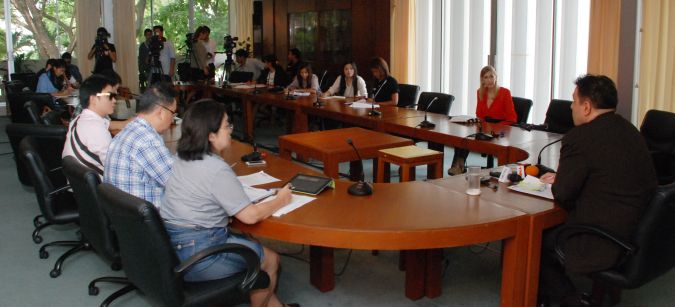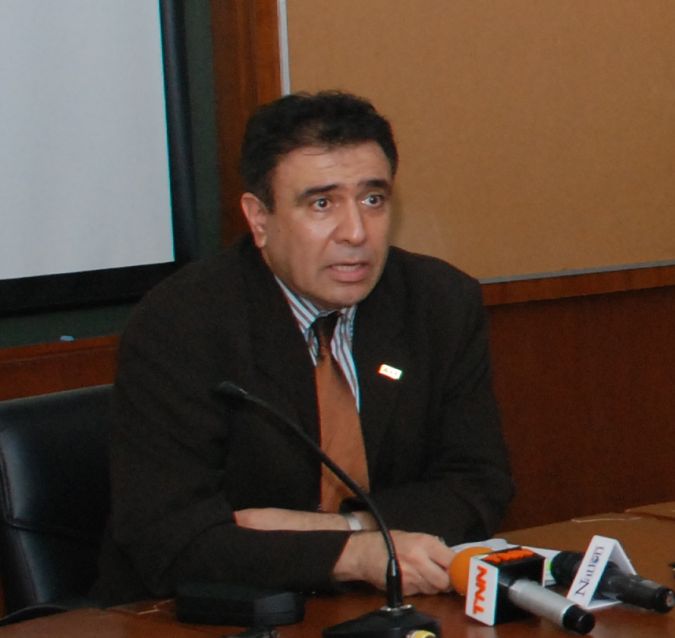The President informed the media that the Council of AIT had already
communicated to Thailand’s Ministry of Foreign Affairs (MFA) to
organize a stakeholders’ meeting to resolve the current
impasse.
In the one-hour media exchange in the AIT Boardroom with journalists
from Nation TV, TNN, Channel 5, Bangkok Post, Prachachart Turakij,
Krungthep Turakij, and MCOT, the president addressed issues regarding
the students’ concerns about the legality of AIT degrees as well as a
number of issues related to the new AIT Charter and the institute’s
legal position in Thailand. The president also replied to questions
about the administration’s relations with the AIT Alumni, reported
rumors about staff dismissals, false accusations of attempts to
privatize the institute and AIT’s strategic direction.
Reacting strongly to what he called “known and anonymous attacks and
deliberate attempts to communicate misinformation” the president
answered all questions posed in Thai through translators.
President Irandoust carefully described the nine-year process to
become an international intergovernmental organization (IO) through the
development of a new Charter, starting in the early-2000s with former
Prime Minister of Thailand and former Chairman of the AIT Board of
Trustees, H.E. Mr. Anand Panyarachum, leading to AIT’s most recent
Chairman of the Board of Trustees, H.E. Dr. Tej Bunnag. It was the
Ministry of Foreign Affairs Thailand that invited 13 countries and one
UN agency to sign the new Charter in 2010, he stated, adding it was
also the host country that encouraged all nations to ratify, as nine
countries have so far done. He reiterated that “the whole process to
upgrade AIT’s status was supervised and guided by the host country
Thailand under the leadership of the Ministry of Foreign Affairs.”
Everything was on course, he said, when suddenly the many-year
process was halted. Thailand’s ratification, as host country, was
stopped by a written letter of complaint from the AIT Alumni
Association Thailand Chapter to the Ministry of Foreign Affairs, which
is yet to be disclosed to the public, he said.
He further added that while the communication from MoFA indicates
that the AITAA Thailand has raised issues about transparency in AIT’s
management, they themselves are not willing to transparently
communicate their concerns and are unwilling to disclose their letter.
He challenged the president of the AIT Alumni Association, Thailand
Chapter, to a debate.
Responding to reports that following the new Charter AIT’s degree is
no longer recognized by the Office of Civil Service Commission (OCSC),
the president said AIT’s legal status should not be linked to the
academic validity of its degree, which is highly respected and valid
world-wide, and recognized globally.
“We hope that this is a temporary issue, and we are positive that the
issue will be resolved soon,” he said, making the point that students’
interests should not be affected as the nine-member AIT Council is
coordinating to meet with the Royal Thai Government to find a
resolution to the problem. “Validity of our degree should be linked
only to the quality of academics at AIT,” he stressed.
President Irandoust also called reports of an ongoing takeover by
Laureate Universities International to manage AIT as “completely
false.” The idea of exploring public-private partnerships with various
enterprises as a partnership is not a takeover, he said. This was
something the Executive Committee explored as authorized by the former
Board of Trustees.
“Discussions that started with Laureate ended without any
collaboration,” the president confirmed. He added that the institute's
non-profit status is one of the most important articles of the new
Charter and this is a core value of AIT that cannot be
compromised.
The AIT administration now works under the full control of the AIT
Council, continues to explore options for scaling-up its operations in
Asia and Africa, and is in a position to open satellite campuses in the
region, he stated. AIT’s proposed strategy of linking operations abroad
back to the mother campus in Thailand would boost Thailand’s claim to
be a hub for higher education in the same way as it is for the tourism
and health care sectors, he explained.
“We currently have invitations from the government of Sri Lanka and
the government of Vietnam to establish full-fledged campuses in those
countries,” President Irandoust confirmed.
Asked if he had ordered 7 staff who opposed his administration to
leave AIT, the President denied the claim as misinformation and
rumor. The institute is advertising for a number of new staff, he
said. AIT is in a new stage of development, he added, and
requires hiring more faculty members to grow. Staff turnover in any
organization is natural and it should not be linked to create any false
rumor.
Questioned how likely it would be for AIT to relocate to another
country, President Irandoust stated: “Such a move must be endorsed by
the AIT Council. I hope Thailand will host AIT for the next 50 years.
AIT’s mission in Thailand is not over.”


